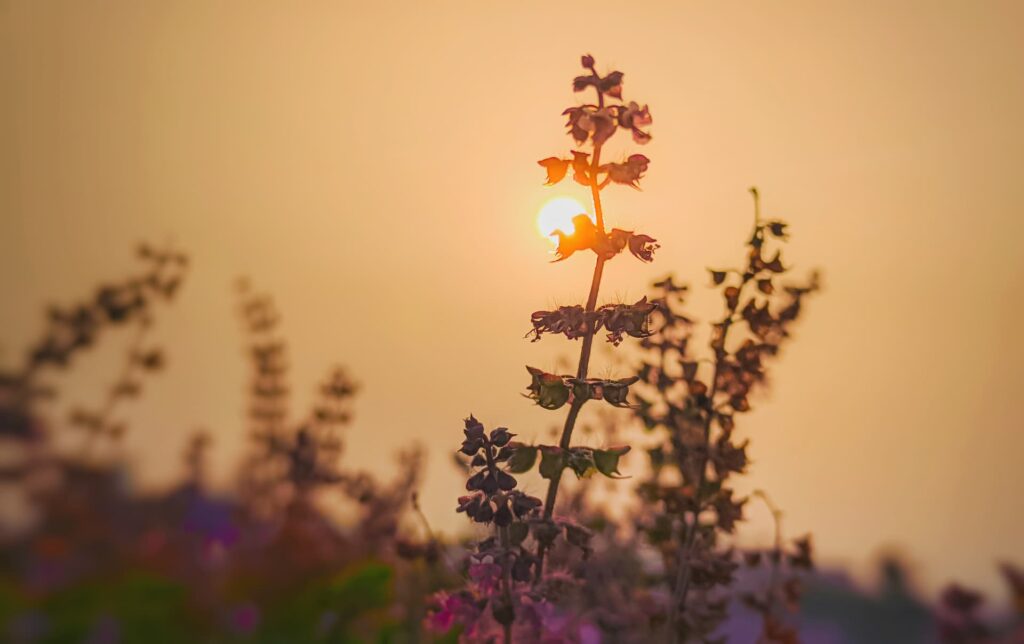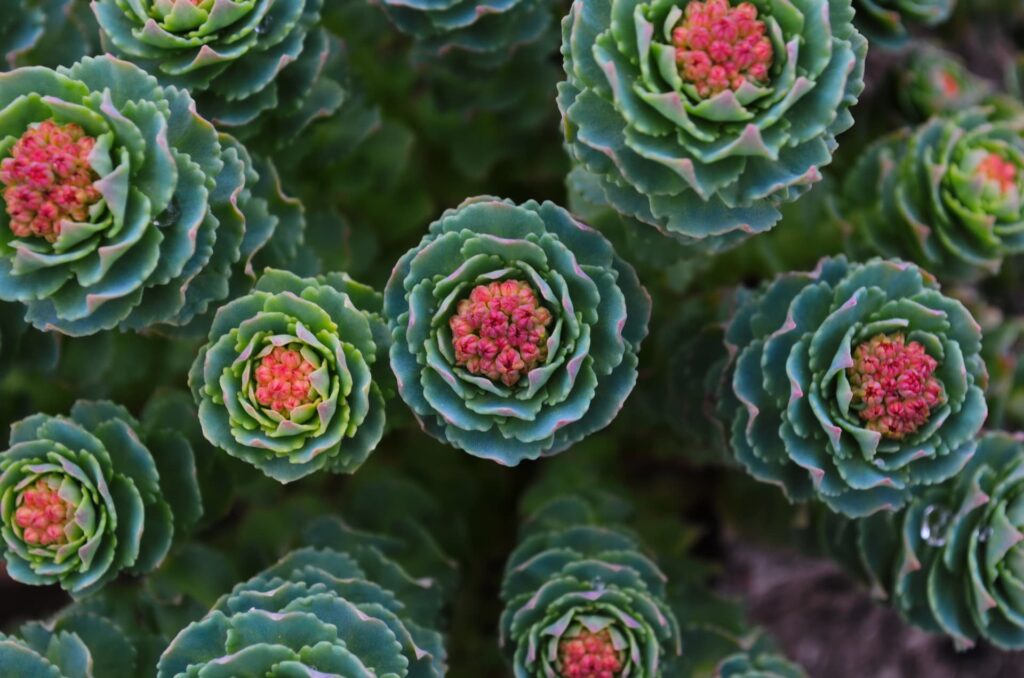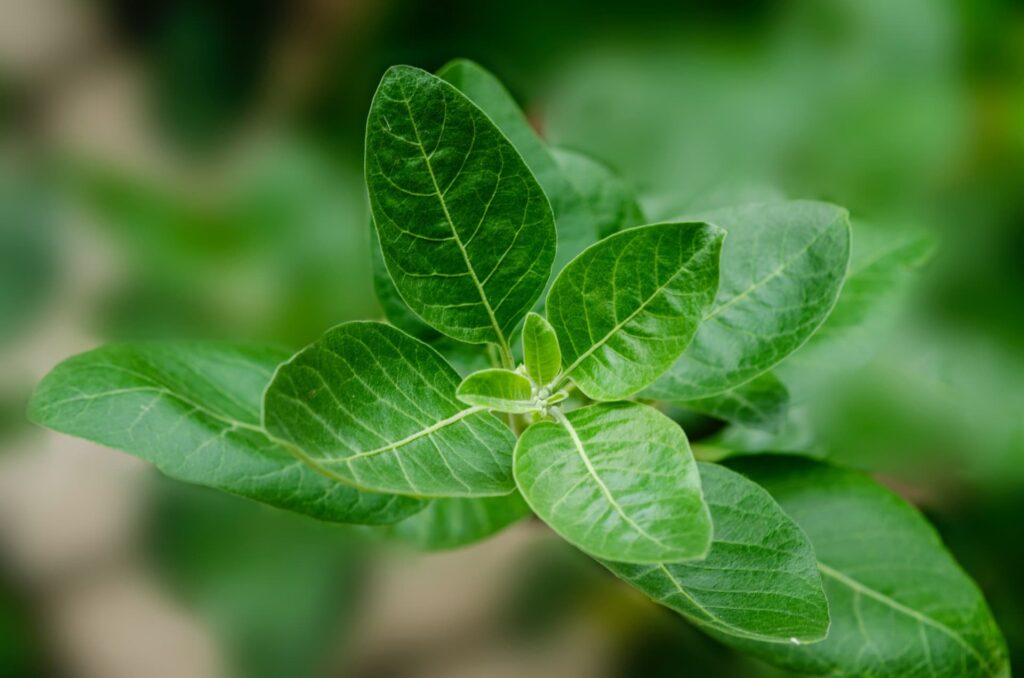Three Incredible Adaptogens for Relieving Stress and Anxiety

No one is totally immune from excess stress and anxiety; it’s something we all deal with. Unfortunately, for a lot of people the symptoms can get quite severe. In fact, according to the National Center for Health Statistics, roughly 30% of the adult population in the United States reports experiencing symptoms of an anxiety disorder. [1] That translates to roughly seventy seven million people experiencing at least some of the symptoms of a clinical anxiety disorder! [2] Even if your symptoms don’t rise to this level (and we certainly hope that they do not), just about everyone could use a little help mitigating the extra stress and anxiety in their lives.
The most obvious reason why it’s so common to seek relief is that it’s simply unpleasant to feel anxious and stressed out all the time. But beyond the discomfort caused by these feelings, there’s also a physical imperative to getting a handle on excess stress. Chronic or long term stress can cause, or exacerbate, different physical diseases, including: high blood pressure, arterial blockages, excess weight gain, and changes in the brain that increase susceptibility to anxiety, depression, and addiction. [3]
There are a lot of options out there for managing excess stress and anxiety (exercise, meditation, therapy, medication, etc.). If you are experiencing severe symptoms you should speak with a qualified medical professional to see what approaches may be best for you. With that being said, one increasingly common option that more and more people are turning to for help curbing their excess stress and anxiety is the use of adaptogens. This post will dive into this increasingly popular treatment option, starting with an explanation of what adaptogens are, a little about how they are believed to work, and finishing with a look at three of our favorite adaptogens for fighting stress and anxiety.
What are Adaptogens?
So to start with, what exactly is an adaptogen? There are a variety of definitions floating around out there, but for our purposes we’ll keep it simple. Adaptogens are plant based substances that help the body “adapt to stress and maintain/normalize metabolic functions” and are associated with “better mental and physical performance.” [4] Essentially, they are plant based substances with medicinal properties that help us mitigate the negative effects of stress on the body, whether that stress is caused by emotional, physical, mental, or other factors.
Many of these plants have deeply rooted histories in different traditional medical systems from across the world. In some cases, they have been used for thousands of years. Scientific research is increasingly catching up with what many traditional practitioners have long-observed– these plant-based adaptogens can make a real difference when it comes to reducing stress. While there is still much room for scientific exploration, the body of evidence available is promising and has increasingly validated the beneficial effects of many of these plant based substances.
How do Adaptogens Work?
So, how do adaptogens work? Well, there’s still a lot left to discover, and the precise mechanism of action is not fully understood, but at a high level there are some commonalities that can be noted. Adaptogens are generally believed to act upon the hypothalamic - pituitary - adrenal axis (the “HPA axis”) [5,6] which plays a primary role in the body’s stress response. When we experience a stressful event, a series of hormonal signals are sent along the HPA axis, which function to keep our body on high alert. Many people have some awareness of cortisol as the so-called “stress hormone;” cortisol release is one of the steps in this cascading process that happens when we are stressed. [7] The precise mechanism of action of adaptogens is complex and unknown, but they are believed to inhibit the release of many of the chemical mediators of stress (including cortisol) [8] and increase the production of a protein associated with protection against stress at the cellular level. [9]
Even without understanding precisely how each plant based adaptogen acts on the body to relieve stress, the evidence of their ability to actually reduce stress in people gathered across different studies is promising. In the following sections, we’ll take a look at three of our favorite adaptogens to help combat stress and anxiety and some of the studies that have been conducted on each. We’ll focus on studies that are generally more recent and involve actual human trials and then follow up with links to more comprehensive reviews of all studies (including older ones, and animal research) on these adaptogens if you’re interested in diving deeper.
Three of Our Favorite Adaptogens for Stress and Anxiety
Holy Basil

Holy Basil, also known as Tulsi (or in more scientific terms, Ocimum tenuiflorum), is an herb that has long been revered on the Indian subcontinent. Referred to as an “elixir of life” and used for more than 3000 years within the Ayurvedic medical system, Holy Basil was traditionally used as a treatment for many ailments, including joint pain, fever, and bronchitis. [10] In modern times, Holy Basil has begun to be studied for its ability to help people cope with stress and to provide relief from anxiety. The following studies demonstrate some of the promise this plant-based adaptogen holds when it comes to relieving stress and anxiety:
- A 2022 study tested Holy Basil’s potential beneficial effects on stress, mood, and sleep in a group of 100 mild to moderately anxious people. The randomized, double blind, study lasted eight weeks and saw study participants in the test group receive 125mg of Holy Basil twice daily. At the end of the eight weeks participants in the test group had significantly lower scores on the Perceived Stress Scale (a 37% decline compared to a 19% decline for the placebo group). Participants that received the Holy Basil also showed lower concentrations of cortisol in their hair (roughly one third of the concentration of cortisol found in the placebo group).
- In a similar vein, an earlier study from 2015, compared the effect of people receiving 300mg of Holy Basil daily for 30 days versus those receiving a placebo. The participants receiving the Holy Basil demonstrated lower salivary cortisol levels and lower anxiety scores at the end of 30 days (though the results appear not to have reached statistical significance).
- Finally, a smaller 2008 study that recruited 35 people diagnosed with generalized anxiety disorder, tested Holy Basil’s effectiveness at reducing anxiety and associated depression. Participants received 500mg of Holy Basil twice daily after meals. Based on the feedback received from participants after sixty days (using standard psychological questionnaires) there was a significant improvement in anxiety, associated depression, and attention.
Traditional experience, and increasingly modern study, are validating Holy Basil’s potential for relieving stress and anxiety. For a broader review of studies researching the potential health benefits of Holy Basil for stress check out this paper and if you are interested in learning more about the full range of health benefits of Holy Basil being researched this 2014 review of the literature is a good place to start.
Available at Haskill: Holy Basil is available at Haskill Creek Farms as a bulk herb (Vana, Krishna & Rama variants), in capsules, or as an ingredient in multi-ingredient products.
Rhodiola rosea

Rhodiola rosea is a low-lying perennial that grows in high altitude, arctic areas, in northern Europe and Asia. It has been used for centuries in Scandinavian countries and Russia to treat fatigue, depression, infections, and other ailments. [11] Since 1960 more than 100 studies have been published on the adaptogenic properties of Rhodiola rosea, but its potential has been less well known in the Western world, perhaps because the majority of those studies were published in Slavic languages. [12] Fortunately, awareness of the potential stress mitigating effects of Rhodiola has grown over the years, and more recent studies are building upon the traditional base of knowledge; here are a few:
- A 2015 study of 80 mildly anxious adults, randomized participants into two groups. The first received 400 mg of rhodiola rosea daily, and the second received no treatment. At the end of the 14 day period the group receiving Rhodiola Rosea showed significant reductions in self-reported stress, anxiety, anger, and depression compared to the control group. The group receiving rhodiola rosea also should significant improvements in overall mood.
- A smaller trial from 2005 tested the effect of a 340 mg daily regimen of rhodiola rosea on ten patients diagnosed with generalized anxiety disorder from the UCLA Anxiety Disorders Program. Athe end of the 10 week study participants showed significant improvement on the Hamilton Anxiety Rating Scale.
- A pair of 2021 studies tested the effect of a combination treatment made up of magnesium, b vitamins, rhodiola extract and green tea extract (all substances thought to have stress protective effects). In the first study 100 chronically stressed, but otherwise healthy, adults were randomized into either a treatment group or a placebo group. After 28 days the participants receiving the combination treatment showed a statistically significant decrease in stress scores over the placebo group. In the second study, participants' brain waves were measured after being forced to perform a stressful task. Participants receiving the combination treatment showed a significant increase in resting theta brain waves which are associated with a relaxed attentive mental state. These participants also demonstrated a significant decrease in stress scores over the placebo group.
Recent studies are providing more support for the traditional use of rhodiola rosea to relieve stress and enhance performance. For a more comprehensive overview of the research into rhodiola rosea’s ability to relieve stress, this 2022 review is a good place to start.
Available at Haskill: Rhodiola rosea is available at Haskill Creek Farms as a bulk herb, in capsules, and as an ingredient in multi-ingredient products.
Ashwagandha

Similar to Holy Basil, Ashwagandha has a longstanding (read, thousands of years) and prominent role within the Ayurvedic medicinal system. Regarded as a Rasayana, or a general tonic that enhances well being, mental alertness, resistance to disease, and longevity, [13] Ashwagandha was traditionally used in the treatment of inflammation, emaciation, weakness and neurological disorders. [14] Some promising recent studies are lending further credence to the traditional notion that ashwagandha can serve as an effect buffer against excess stress and anxiety:
- A 2012 double blind, randomized, placebo controlled study of 64 chronically stressed adults tested the ability of Ashwagandha root extract to alleviate the symptoms of stress and anxiety. Participants in the treatment group received 600 mg of Ashwagandha root extract each day for 60 days. At the end of the trial period, the treatment group showed a 44% reduction in perceived stress scores compared to just a 5.5% percent reduction seen in the placebo group.Scores on two additional psychological scales meant to measure stress, anxiety, and depression showed similarly dramatic improvements amongst the treatment group compared to the placebo group. Finally, the group receiving the Ashwagandha extract showed a 27.9% decrease in cortisol levels in their blood by the end of the study, while the placebo group showed only a 7.9% decrease.
- A 2019 study tested the effects of a smaller daily dose of Ashwagandha extract (240 mg) on stress and anxiety. Sixty people participated in the study and they were randomly separated into a treatment group and a placebo group. After 60 days the participants in the treatment group (those taking the Ashwagandha extract) showed a statistically significant improvement on the Hamilton Anxiety Rating Scale. The treatment group also showed a statistically significant decrease in cortisol levels compared to the placebo group (23% reduction vs. 0.5% increase), and in DHEA, another hormone associated with the stress response (8% reduction vs. 2.5% increase).
- A 2016 study of 52 chronically stressed and overweight adults tested the effect of a daily dose of 600 mg of Ashwagandha extract on perceived stress and food cravings. The group randomly selected to receive the Ashwagandha treatment for eight weeks showed a 32.7% decrease in perceived stress scores at the end of the treatment period compared to a 10.6% decrease in the placebo group. Similarly, the group receiving the Ashwagandha extract showed statistically significant reductions in food cravings as measured by the Food Cravings Questionnaire at the end of eight weeks compared to the placebo group.
In addition to the above, a pair of 2022 studies looking at the ability of Ashwagandha to help decrease stress, increase energy, improve sleep quality, and reduce food cravings in a population of college students both showed promising results (see here and here). And if you are interested in learning more, this 2021 review of Ashwagandha’s effects on stress, anxiety, depression, and insomnia, should be helpful.
Available at Haskill: Ashwagandha is available at Haskill Creek Farms as a bulk herb, in capsules, and as an ingredient in multi-ingredient products.
References:
[1] https://www.cdc.gov/nchs/covid19/pulse/mental-health.htm
[3,7] https://www.health.harvard.edu/staying-healthy/understanding-the-stress-response
[4,6,8] Todorova V, Ivanov K, Delattre C, Nalbantova V, Karcheva-Bahchevanska D, Ivanova S. Plant Adaptogens-History and Future Perspectives. Nutrients. 2021 Aug 20;13(8):2861. doi: 10.3390/nu13082861. PMID: 34445021; PMCID: PMC8398443.
[5] Liao LY, He YF, Li L, Meng H, Dong YM, Yi F, Xiao PG. A preliminary review of studies on adaptogens: comparison of their bioactivity in TCM with that of ginseng-like herbs used worldwide. Chin Med. 2018 Nov 16;13:57. doi: 10.1186/s13020-018-0214-9. PMID: 30479654; PMCID: PMC6240259.
[9] Panossian A, Wikman G, Kaur P, Asea A. Adaptogens exert a stress-protective effect by modulation of expression of molecular chaperones. Phytomedicine. 2009 Jun;16(6-7):617-22. doi: 10.1016/j.phymed.2008.12.003. Epub 2009 Feb 1. PMID: 19188053.
[10] Mondal S, Mirdha BR, Mahapatra SC. The science behind sacredness of Tulsi (Ocimum sanctum Linn.). Indian J Physiol Pharmacol. 2009 Oct-Dec;53(4):291-306. PMID: 20509321.
[11, 12] https://www.herbalgram.org/resources/herbalgram/issues/56/table-of-contents/article2333/

Sign up for
our newsletter!
Join to get the Haskill Newsletter and be the first to learn about new products, events, and other goings-on at Haskill Creek!





